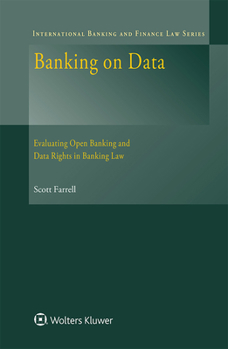Banking on Data: Evaluating Open Banking and Data Rights in Banking Law
International Banking and Finance Law Series, Volume 37
Despite open banking's broad emergence in a variety of jurisdictions and the ambition shared for the benefits it is to deliver, there is a distinct lack of detailed analysis of the legal features which are needed for it to be effectively established. This indispensable study is the first to analyse open banking's legal foundations by reference to banking law rather than to privacy law or competition law. With a detailed focus on the mature open banking systems of Australia and the United Kingdom, including Australia's Consumer Data Right, the book's thoroughgoing legal perspective provides a comprehensive framework which can be used to evaluate and design open banking in any jurisdiction.
The presentation proceeds through a comparison of the legal rights, responsibilities, and relationships under open banking systems with equivalent rights in traditional banking payment systems. This process clearly reveals and addresses such salient open banking and data-sharing issues as the following:
what data should be shareable and who should be required to share data;
how data should be shared and how rights to share data should be established;
the role of data minimisation and the role of consent;
how laws, standards, rules, and technology interact in an open banking system;
how open banking fosters competition, innovation, and financial inclusion;
how consumer protection can be included by design;
management of quality and security of shared data;
facilitation and regulation of participation;
legal relationships and allocation of liability among participants;
compensation for customers if something goes wrong;
strategic challenges and opportunities;
enforceability and insolvency;
systemic efficacy and safety; and
the role of trust.
Also included is an assessment framework designed to categorise the risks which arise in open banking and other data-sharing systems.
As a systematic appraisal of how banking law can be used to ensure the customer autonomy, data portability, recipient accountability and participant connectivity promised by open banking systems, the book's legal perspective on the value of customer data will prove of inestimable value for lawyers in banking and finance, as well as for professionals in financial services or information technology.
Related Subjects
Law




